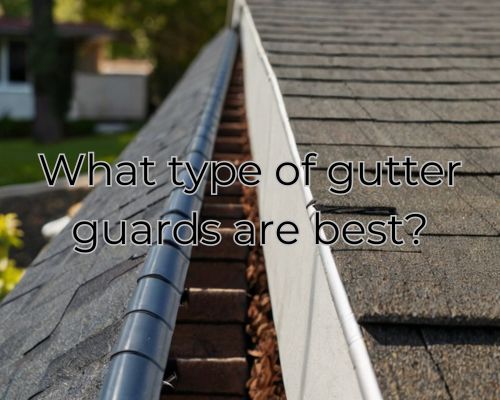
A Comprehensive Guide
Choosing the right gutter guards for your home can be daunting with so many options available.
“Micro-mesh gutter guards are often considered the best due to their ability to block even the smallest debris while allowing water to flow freely. These are a reliable choice for homes in areas prone to heavy leaf fall or frequent storms.” said Mike Owen from Gutters Of West Palm Beach.

However, different types of gutter guards come with unique benefits tailored to specific needs.
Brush guards are easy to install and maintain, making them suitable for those looking for a quick and affordable solution. Meanwhile, foam inserts are perfect for homeowners who want a low-maintenance option that fits easily into existing gutters.
Considering your home’s geographical location and weather conditions is key when selecting gutter guards.
Whether you need heavy-duty options like metal mesh for areas with heavy rain or simpler plastic grids for moderate climates, understanding your specific needs will help you make the most informed decision.
Types of Gutter Guards and Material Considerations
Choosing the right gutter guard involves understanding the different types available and evaluating their materials for quality and durability. Additionally, you need to consider the compatibility of the gutter guard with your existing setup and the ease of installation.
Understanding Different Gutter Guard Types
Various types of gutter guards are designed to meet different needs. The main types include:
- Screen: These are simple to install and prevent large debris from entering the gutters.
- Micro-Mesh: Made from fine mesh, they block small debris and are highly effective in filtration.
- Reverse Curve: These use surface tension to guide water into the gutter while keeping debris out.
- Brush: Consist of bristles that capture debris but allow water to flow through.
- Foam: Inserted into the gutter to block debris while permitting water to pass.
Material Quality and Durability
The materials used in gutter guards significantly affect their performance and lifespan. Here are some common materials:
- Aluminum: Lightweight and rust-resistant, ideal for most climates.
- Stainless Steel: Very durable, resistant to rust and corrosion.
- Plastic/Vinyl/PVC: Generally cheaper but less durable and prone to warping.
- Copper: Offers aesthetic appeal and is very durable but expensive.
- Powder-Coated Steel: Provides additional rust resistance and durability.
Micro-mesh and steel micro-mesh guards, often made from high-quality stainless steel, are valued for their longevity and effectiveness. Meanwhile, foam and plastic guards can deteriorate faster and may require frequent replacement.
Gutter Compatibility and Installation
Before selecting a gutter guard, assess your existing gutters for compatibility. Some critical considerations include:
- Size and shape: Ensure the guard fits securely on your gutters.
- Ease of installation: Some guards require professional installation, while others are more DIY-friendly.
- Mounting options: Check if the guard can be screwed into, clipped onto, or fitted inside the gutter.
Reviewing these factors helps you choose a gutter guard that not only meets your functional needs but also integrates seamlessly with your current gutter system.
Evaluating Performance, Maintenance, and Cost
Choosing the right gutter guards involves understanding how they perform under various conditions, their maintenance needs, and their cost implications. Mike Owen from Gutters Of West Palm Beach will guide you through these critical factors.
Assessing Gutter Guard Performance
Performance is often the most critical aspect. You need to consider how effective the gutter guard is at preventing debris such as leaves, pine needles, and other organic material from clogging your gutters.
Micro-mesh guards are highly effective at filtering out even tiny debris. They can handle heavy rain without allowing water to overflow.
Brush and foam guards, while easy to install, might struggle with smaller debris. Material durability, like rust resistance in metal guards, also plays a key role in performance.
Maintenance and Cleaning Requirements
Maintenance is an ongoing concern for any gutter protection system. Some types of guards are more low-maintenance than others.
Micro-mesh and reverse curve guards usually require less frequent cleaning because they allow water to flow while blocking debris.
On the other hand, brush and foam guards may need more frequent attention, as debris can get trapped within the guard material itself, necessitating periodic removal and cleaning.
DIY installations can save on costs but may require you to handle the cleaning yourself. Professional installations often come with maintenance agreements, reducing your hassle.
Cost Analysis and Warranty Coverage
Cost varies widely among different types of gutter guards. Prices can range from around $5 per linear foot for basic plastic guards to over $30 for high-end metal options.
For instance, Gutter Guards America offers a system costing an average of $5,270 for a 200-linear-foot setup. Monthly payment plans are available for these systems.
Warranty is another critical factor. Some brands offer a lifetime warranty, while others come with a 25-year warranty. Longer warranties can provide peace of mind about your investment and indicate the durability and reliability of the product.
When evaluating cost, also consider the long-term savings on gutter cleaning and potential water damage. Then, compare it to the upfront price to determine overall value.





